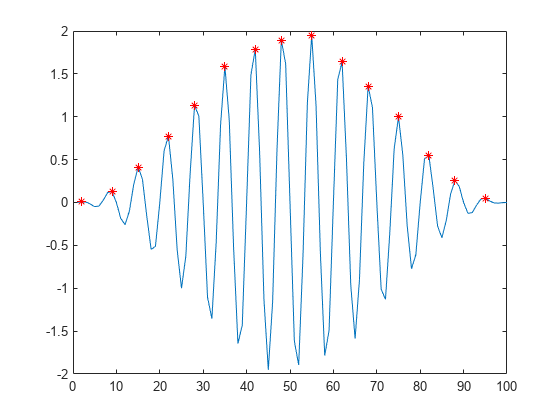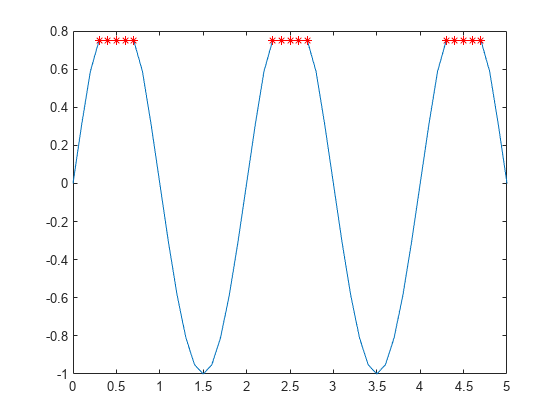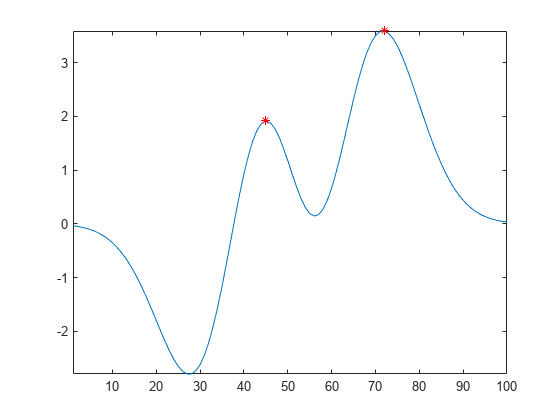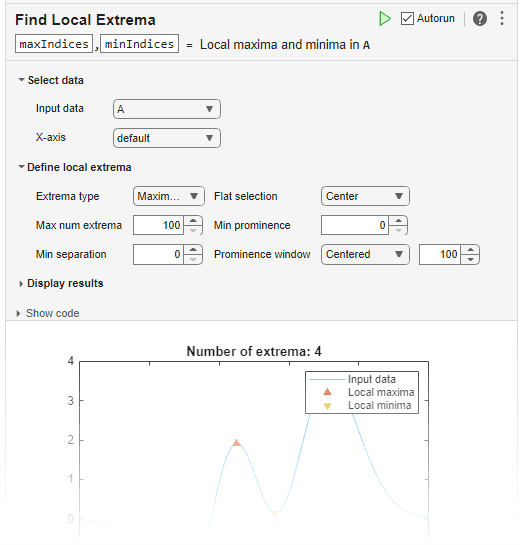islocalmax
Find local maxima
Syntax
Description
TF = islocalmax(A)true) when a local
maximum is detected in the corresponding element of A.
You can use islocalmax functionality interactively by adding
the Find Local
Extrema task to a live script.
TF = islocalmax(___,Name,Value)islocalmax(A,'SamplePoints',t) finds local maxima of
A with respect to the time stamps contained in the time
vector t.
[
also returns the prominence corresponding to each element of TF,P] = islocalmax(___)A.
Examples
Compute and plot the local maxima of a vector of data.
x = 1:100;
A = (1-cos(2*pi*0.01*x)).*sin(2*pi*0.15*x);
TF = islocalmax(A);
plot(x,A,x(TF),A(TF),'r*')
Create a matrix of data, and compute the local maxima for each row.
A = 25*diag(ones(5,1)) + rand(5,5); TF = islocalmax(A,2)
TF = 5×5 logical array
0 0 1 0 0
0 1 0 0 0
0 0 1 0 0
0 1 0 1 0
0 1 0 0 0
Compute the local maxima of a vector of data relative to the time stamps in the vector t. Use the MinSeparation parameter to compute maxima that are at least 45 minutes apart.
t = hours(linspace(0,3,15)); A = [2 4 6 4 3 7 5 6 5 10 4 -1 -3 -2 0]; TF = islocalmax(A,'MinSeparation',minutes(45),'SamplePoints',t); plot(t,A,t(TF),A(TF),'r*')

Specify a method for indicating consecutive maxima values.
Compute the local maxima of data that contains consecutive maxima values. Indicate the maximum of each flat region based on the first occurrence of that value.
x = 0:0.1:5; A = min(0.75, sin(pi*x)); TF1 = islocalmax(A,'FlatSelection','first'); plot(x,A,x(TF1),A(TF1),'r*')

Indicate the maximum of each flat region with all occurrences of that value.
TF2 = islocalmax(A,'FlatSelection','all'); plot(x,A,x(TF2),A(TF2),'r*')

Select maxima based on their prominence.
Compute the local maxima of a vector of data and their prominence, and then plot them with the data.
x = 1:100; A = peaks(100); A = A(50,:); [TF1,P] = islocalmax(A); P(TF1)
ans = 1×2
1.7703 3.5548
plot(x,A,x(TF1),A(TF1),'r*') axis tight

Compute only the most prominent maximum in the data by specifying a minimum prominence requirement.
TF2 = islocalmax(A,'MinProminence',2); plot(x,A,x(TF2),A(TF2),'r*') axis tight

Input Arguments
Input data, specified as a vector, matrix, multidimensional array, table, or timetable.
Operating dimension, specified as a positive integer scalar. If no value is specified, then the default is the first array dimension whose size does not equal 1.
Consider an m-by-n input matrix,
A:
islocalmax(A,1)computes local maxima according to the data in each column ofAand returns anm-by-nmatrix.
islocalmax(A,2)computes local maxima according to the data in each row ofAand returns anm-by-nmatrix.
For table or timetable input data, dim is not supported
and operation is along each table or timetable variable separately.
Name-Value Arguments
Specify optional pairs of arguments as
Name1=Value1,...,NameN=ValueN, where Name is
the argument name and Value is the corresponding value.
Name-value arguments must appear after other arguments, but the order of the
pairs does not matter.
Before R2021a, use commas to separate each name and value, and enclose
Name in quotes.
Example: TF = islocalmax(A,'MinProminence',2)
Data Options
Sample points, specified as a vector of sample point values or one of
the options in the following table when the input data is a table. The
sample points represent the x-axis locations of the
data, and must be sorted and contain unique elements. Sample points do
not need to be uniformly sampled. The vector [1 2 3
...] is the default.
When the input data is a table, you can specify the sample points as a table variable using one of these options:
| Indexing Scheme | Examples |
|---|---|
Variable name:
|
|
Variable index:
|
|
Function handle:
|
|
Variable type:
|
|
Note
This name-value argument is not supported when the input data is a
timetable. Timetables use the vector of row times as the sample
points. To use different sample points, you must edit the timetable so that the row times
contain the desired sample points.
Example: islocalmax(A,'SamplePoints',0:0.1:10)
Example: islocalmax(T,'SamplePoints',"Var1")
Table variables to operate on, specified as one of the options in this
table. The DataVariables value indicates which
variables of the input table to examine for local maxima. The data type
associated with the indicated variables must be numeric or
logical.
The first output TF contains
false for variables not specified by
DataVariables unless the value of
OutputFormat is
'tabular'.
| Indexing Scheme | Values to Specify | Examples |
|---|---|---|
Variable name |
|
|
Variable index |
|
|
Function handle |
|
|
Variable type |
|
|
Example: islocalmax(T,'DataVariables',["Var1" "Var2"
"Var4"])
Output data type, specified as one of these values:
'logical'— For table or timetable input data, return the outputTFas a logical array.'tabular'— For table input data, return the outputTFas a table. For timetable input data, return the outputTFas a timetable.
For vector, matrix, or multidimensional array input data,
OutputFormat is not supported.
Example: islocalmax(T,'OutputFormat','tabular')
Extrema Detection Options
Minimum prominence, specified as a nonnegative scalar.
islocalmax returns only local maxima whose
prominence is at least the value specified.
Prominence window, specified as a positive integer scalar, a two-element vector of positive integers, a positive duration scalar, or a two-element vector of positive durations. The value defines a window of neighboring points for which to compute the prominence for each local maximum.
When the window value is a positive integer scalar
k, then the window is centered about each local
maximum and contains k-1
neighboring elements. If k is even, then the window
is centered about the current and previous elements. If a local maximum
is within a flat region, then islocalmax treats the
entire flat region as the center point of the window.
When the value is a two-element vector of positive
integers[b f], then the window contains the local
maximum, b elements backward, and
f elements forward. If a local maximum is within
a flat region, then the window starts b elements
before the first point of the region and ends f
elements after the last point of the region.
When the input data is a timetable or SamplePoints
is specified as a datetime or
duration vector, the window value must be of type
duration, and the window is computed relative to
the sample points.
Flat region indicator for when a local maximum value is repeated consecutively, specified as one of these values:
'center'— Indicate only the center element of a flat region as the local maximum. The element ofTFcorresponding to the center of the flat is 1, and is 0 for the remaining flat elements.'first'— Indicate only the first element of a flat region as the local maximum. The element ofTFcorresponding to the start of the flat is 1, and is 0 for the remaining flat elements.'last'— Indicate only the last element of a flat region as the local maximum. The element ofTFcorresponding to the end of the flat is 1, and is 0 for the remaining flat elements.'all'— Indicate all the elements of a flat region as the local maxima. The elements ofTFcorresponding to all parts of the flat are 1.
When using the MinSeparation or
MaxNumExtrema name-value arguments, flat region
points are jointly considered a single maximum point.
Minimum separation between local maxima, specified as a nonnegative
scalar. The separation value is defined in the same units as the sample
points vector, which is [1 2 3 ...] by default. When
the separation value is greater than 0, islocalmax
selects the largest local maximum and ignores all other local maxima
within the specified separation. This process is repeated until there
are no more local maxima detected.
When the sample points vector has type datetime,
the separation value must have type duration.
Maximum number of maxima, specified as a positive integer scalar.
islocalmax finds no more than the specified
number of the most prominent maxima, which is the length of the
operating dimension by default.
Output Arguments
Local maxima indicator, returned as a vector, matrix, multidimensional array, table, or timetable.
TF is the same size as A unless the
value of OutputFormat is 'tabular'. If
the value of OutputFormat is
'tabular', then TF only has variables
corresponding to the DataVariables specified.
Data Types: logical
Prominence, returned as a vector, matrix, multidimensional array, table, or timetable.
If
Pis a vector, matrix, or multidimensional array,Pis the same size asA.If
Pis a table or timetable,Pis the same height asAand only has variables corresponding to theDataVariablesspecified.
If the input data has a signed or unsigned integer type, then
P is an unsigned integer.
Algorithms
islocalmax identifies all local maxima (or peaks) in the input
data and follows these steps to compute the prominence of each local maximum. The
prominence of a local maximum measures how the peak stands out with respect to its
height and location relative to other peaks.
Draw a horizontal line to the left and right from the current peak. Stop drawing each segment of the horizontal line when it reaches the edge of the data or intersects the data.
Identify the valleys under the horizontal line.
Use the highest of those valleys as the basis value. The prominence is the absolute difference between the height of the current local maximum and the basis value.

Alternative Functionality
Live Editor Task
You can use islocalmax functionality interactively by adding
the Find Local
Extrema task to a live script.

Extended Capabilities
The
islocalmax function supports tall arrays with the following usage
notes and limitations:
Tall timetables are not supported.
You must specify a value for the
ProminenceWindowname-value argument.The
MaxNumExtrema,MinSeparation, andSamplePointsname-value arguments are not supported.The value of
DataVariablescannot be a function handle.
For more information, see Tall Arrays.
Usage notes and limitations:
You must enable support for variable-size arrays.
The
ProminenceWindowname-value argument is not supported.
This function fully supports thread-based environments. For more information, see Run MATLAB Functions in Thread-Based Environment.
The islocalmax function
fully supports GPU arrays. To run the function on a GPU, specify the input data as a gpuArray (Parallel Computing Toolbox). For more information, see Run MATLAB Functions on a GPU (Parallel Computing Toolbox).
Version History
Introduced in R2017bFor table or timetable input data, return a tabular output TF instead
of a logical array by setting the OutputFormat name-value argument to
'tabular'.
For table input data, specify the sample points as a table variable using the
SamplePoints name-value argument.
MATLAB Command
You clicked a link that corresponds to this MATLAB command:
Run the command by entering it in the MATLAB Command Window. Web browsers do not support MATLAB commands.
Select a Web Site
Choose a web site to get translated content where available and see local events and offers. Based on your location, we recommend that you select: .
You can also select a web site from the following list
How to Get Best Site Performance
Select the China site (in Chinese or English) for best site performance. Other MathWorks country sites are not optimized for visits from your location.
Americas
- América Latina (Español)
- Canada (English)
- United States (English)
Europe
- Belgium (English)
- Denmark (English)
- Deutschland (Deutsch)
- España (Español)
- Finland (English)
- France (Français)
- Ireland (English)
- Italia (Italiano)
- Luxembourg (English)
- Netherlands (English)
- Norway (English)
- Österreich (Deutsch)
- Portugal (English)
- Sweden (English)
- Switzerland
- United Kingdom (English)